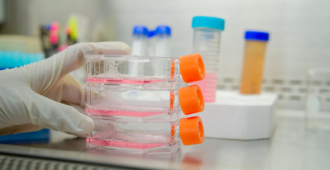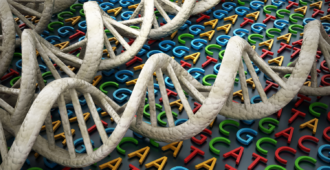Researchers from the Sheffield Institute for Translational Neuroscience (SITraN) at the University of Sheffield have uncovered a new function of the C9orf72 protein. A paper on their work has recently been published in the EMBO Journal.
A change or mutation to the C9orf72 gene is linked to about 40% of cases of inherited MND. We also know that changes to this gene also occur in a type of dementia called frontotemporal dementia (FTD). However, the reasons behind this link have so far been unclear.
One of the main research routes towards explaining the link between the C9orf72 gene and MND is to work out the normal function of this gene. By studying the protein the gene produces, researchers can see how alterations to this protein and the processes it is involved with result in nerve cell damage in MND.
Dr Andrew Grierson and Dr Kurt De Vos, together with a team including MND Association funded PhD student Emma Smith, have discovered that the C9orf72 protein is integral to autophagy, a process where damaged parts and structures within the cell are recycled.
This study has found that when it functions normally the C9orf72 protein controls the start of autophagy, and sends instructions to other proteins involved in this process.
If the C9orf72 protein is faulty then autophagy is disrupted, so no recycling of damaged cell parts takes place. This may explain why we see protein clumps building up in nerve cells during the course of MND.
It is not fully clear how disruption to the autophagy process leads to damage to nerve cells. Knowing more about processes that take place in nerve cells and what controls them will help researchers identify which parts of the cell to target treatments towards.
Dr Sadie Vile, Research Grants Manager at the MND Association, said:
“The autophagy process has been linked to other MND-causing genes, so it is interesting that evidence is now building up to connect this important cellular process to the C9orf72 protein. We are very proud that Emma Smith has played a key role in this important piece of research.”
More information
Journal article: C Webster, E Smith et al (2016) The C9orf72 protein interacts with Rab1a and the ULK1 complex to regulate initiation of autophagy. The EMBO Journal Published online 22 June 2016. Doi: 10.12252/embj.201694401
Read about other research into autophagy and MND and Emma Smith’s MND Association funded PhD research.





